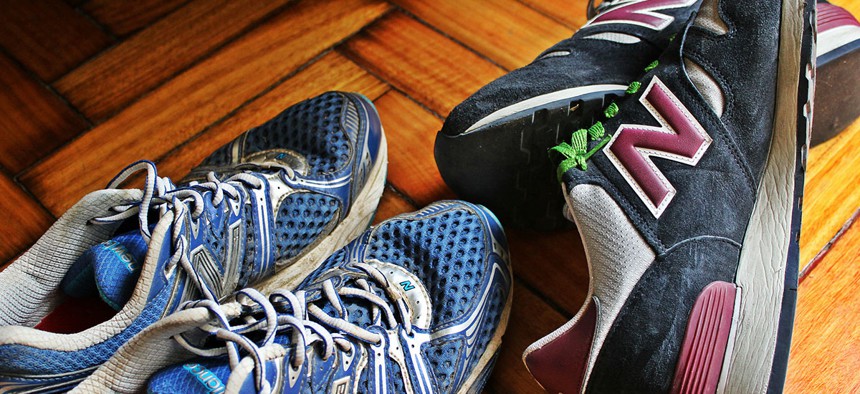
Flickr user Jesús Dehesa
New Balance is Looking to Become the Sneaker Brand of the U.S. Military
Should the sneakers worn by soldiers be made in America?
As the US Senate debates a massive new defense policy bill this week, one provision in it causing some disagreement has little to do with national security. It’s about sneakers, and which brand servicewomen and servicemen will wear.
If bill S. 2943 passes and its provisions are signed into law with section 671 intact, it would require that the Pentagon bring its footwear policy in line with a 1941 law known as the Berry Amendment, which stipulates that clothing and other products used by the military be made in the US. An exception was made several years back for athletic shoes, mainly because of a shortage of domestic options.
But recently, sneaker manufacturer New Balance has been lobbying to remove the exemption. As Bloomberg reports, the Boston-based brand still makes a significant portion of its footwear in the US. A quarter of the shoes it sells in the US are American-made, it told Bloomberg, while big competitors such as Nike do their manufacturing almost entirely overseas.
Right now, the Pentagon gives out vouchers for athletic footwear totaling about $15 million a year, covering up to 250,000 pairs of sneakers, according to an estimate from New Balance. Since Nike is by far the dominant sneaker seller in the US, a large portion of those vouchers are likely used for Nike products. But the bill, if authorized, would stand to eliminate the that program and make New Balance the de facto sneaker supplier of the US armed forces.
A defense bill with an identical provision already passed in the US House of Representatives last month, drawing criticism from a range of opponents, including the Obama administration. In a statement (pdf), the White House said that “[b]ecause it is likely that only one company could benefit disproportionately from such DOD purchasing requirements, this provision essentially serves as preferential arrangement for a particular company.” It also said having one supplier could lead to higher injury rates, since service members would no longer be able to shop around for the shoe that fits them best.
The House version of the legislation was introduced by congresswoman Niki Tsongas, a Democrat from Massachusetts; there is a New Balance factory located in her district. Tsongas wrote a piece for the Boston Globe on June 6, saying the measure wouldn’t offer New Balance any sort of preferential treatment. She noted that companies such as Saucony and Wolverine could compete to supply sneakers, and that it’s “reasonable to expect that new recruits would have a variety of high quality options to choose from.”
For New Balance, the sales it could gain are significant, but not enough to make or break the company, which did about $4 billion in sales last year. It’s even less meaningful to a company like Nike, which had $30 billion in sales last year, though that doesn’t mean Nike wants to see the provision survive. “As a US company with 26,000 employees across the country, Nike believes our servicemen and women should continue to have access to the best possible athletic footwear to fit their foot type and to meet their training needs,” Nike said in a statement.
New Balance could not be reached to comment.
New Balance and Nike have come to represent opposite sides on another recent policy debate, over the proposed Trans-Pacific Partnership (TPP) trade agreement. Nike, which has become a symbol of outsourcing overseas, has publicly supported the deal, which would lower tariffs and restrictions among member nations, including Vietnam, where Nike produces a lot of shoes.
New Balance fought the TPP aggressively, arguing it would hurt its US manufacturing—until the Department of Defense said it would give the company a shot at supplying the military’s athletic shoes. But according to the Boston Globe, New Balance now says the Defense Department failed to follow through.
The Defense Department declined to comment.
(Image via Flickr user Jesús Dehesa)






